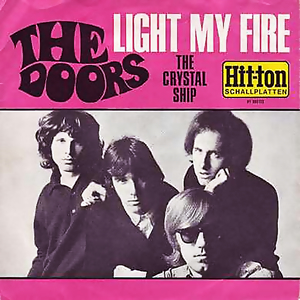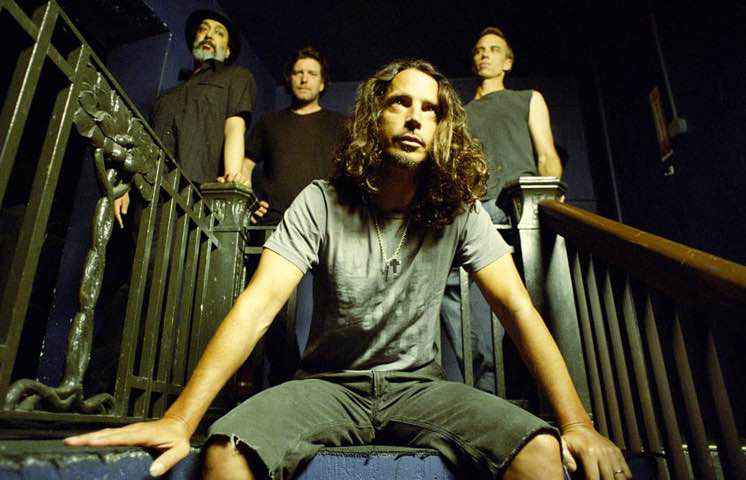I was astonished to realise recently that 2017 would mark the 50th anniversary of the iconic debut album of one of the greatest, most legendary bands in history: The Doors.
I mean, I sort of knew that; but when you actually think about how long 50 years is, you properly realise how old that music is too.
It was in July 1965 that The Doors formed – and it was in 1967 that their self-titled debut album was released.
I listen to The Doors’ music on at least a weekly basis, and I never think of it as being that old. They were, of course, over and done with long before I was born; Jim Morrison died a decade before I was born and I didn’t even know who he was until I was about fifteen.
But such is the enduring power and legacy of Morrison as a poet and The Doors as a musical collective that even five decades later, people even younger than me are every day discovering their music for the first time and beginning a special journey. I envy them that; and almost wish I could listen to something like ‘The Crystal Ship’ or ‘Riders On the Storm’ for the first time again so that I could marvel anew.
That they are one of the greatest bands in music is irrefutable; but I would go further and suggest they were the greatest rock n’ roll band ever.
As far as the big, ‘legendary’ or pioneering bands from before my lifetime are concerned, I’ve never been able to get into the Beatles or the Stones or Dylan or the others the same way I so easily and completely was enchanted by The Doors. Which is no disrespect to the Beatles or anyone else (except the Stones – fuck the Rolling Stones; overrated), but The Doors have always struck me as having superior musicianship in the first instance; but moreover, there’s just something otherwordly and magical about their music.
Some of that is no doubt to do with the mythology around Morrison in particular, but most of it is just purely in their music, which at times is pretty much transcendent.
In truth, The Doors’ catalogue is a hit-or-miss affair; a lot of it isn’t so amazing. But when it’s good, it’s insanely good, insanely special.
So many times when I listened to one of their songs for the first time, I would be completely lost in it in a way that is extremely rare; and often mesmerised by a single moment. Such as the killer bass-riff that kicks in after the second chorus of ‘Strange Days’, the sheer otherwordly quietude of ‘Riders on the Storm’, or the hypnotic, never-ending instrumental bridge on ‘Light My Fire’.
Bands like the Rolling Stones never came close to anything like the sheer transcendent power of ‘Riders on the Storm’ or, most of all, the iconic ‘The End’.
Not that there wasn’t a fair amount of incredible, out-of-this-world music being made in the mid-to-late sixties in America, which for me stands along with the early-to-mid nineties as a prime era for incredible musical output; but even in that context, The Doors stand out in an enormous way.
Keyboardist Ray Manzarek, guitarist Robby Krieger and drummer John Densmore formed an addictive synthesis of sounds and talent, a tight unit whose music far transcended a mere sum of their respective parts. Adding a singer and poet with the extraordinary nature of Jim Morrison to the situation then ensured that The Doors would be elevated to extraordinary levels of musical output.
The band’s name was famously taken from the title of Aldous Huxley’s book The Doors of Perception, which in turn was a reference to a William Blake quote; “If the doors of perception were cleansed every thing would appear to man as it is, infinite...”
That reference is remarkably fitting when you consider that at times The Doors would accomplish in musical terms the ultimate evocation of that ineffable sense of the infinite. That crossroads between music and spiritual/transcendent experience is something that isn’t seen in modern music, certainly not in popular, commercial modern music; but in the late sixties something else was going on.
Some of it was no doubt the drugs; and I used to have arguments with a fellow musician friend of mine about whether removing the LSD from the late sixties would’ve dramatically altered the enduring power of some of those musicians, such as Hendrix and Morrison, and would’ve essentially meant much less interesting and dynamic music. I tended to disagree with that assessment, choosing to believe instead that the actual musical ability and character of people like Hendrix, Robby Krieger or Morrison is what created the exceptional music and not the influence of substances or altered states of consciousness.
As a musician, I almost felt a little offended at the idea that substances rather than ability or vision should take any credit.
But my friend, who at the time did way more drugs than I ever did, argued that although the actual musical ability of the performers wasn’t in question, this musical ability was more like the base level, with the altered states of consciousness being the magical enhancer that really imparted the ‘genius’ to the process. In other words, that what I was thinking of as the creative ‘vision’ was in fact only facilitated by the altered states of being in the first place.

Lots of musicians have ‘aptitude’ and are good at playing their instruments, he argued, but ‘aptitude’ and ‘talent’ are not the same things as ‘vision’ or genius. He’s right about that; I’ve known musicians who are technically faultless but who have absolutely zero creative vision. Even so, I’m not sure I agree with that assessment overall. It’s difficult to look at what Hendrix could do on a guitar and attribute it to drugs; though with Morrison the matter becomes a touch more blurred, as it’s clear that although he was a genius, his altered states of consciousness seemed to have a lot to do with releasing that genius.
In other words, the drugs shouldn’t get any credit for the genius itself, but they could potentially be credited with acting as an ‘enabler’ for that genius to flow.
It’s a difficult question to resolve, particularly when it comes to that part of the sixties, where there was an accompanying cultural or counter-cultural mindset/revolution going on with profound ideas and ideals and where the drugs were simply one part of that process.
It’s much more clear-cut with something like Alice in Chains’ Dirt album in 1992, which was an album not only largely about drug addiction but where some of the creative results were no doubt inspired *out of* Layne Staley‘s experiences on substances.
With The Doors’ it was never overtly about that or like that.
There’s also no question that each member of the group was a remarkably talented musician even before we factor in Morrison.
The group was also incredibly prolific, especially by modern standards, but actually even by the standards of their era; they released eight albums between 1967 and 1971. Those eight records were by no means populated purely by The Doors at their best; the band’s output can be fairly regarded a hit-or-miss business, sometimes pure magic, other times a little unremarkable.
But genius is often like that: temperamental and uncertain. Jim Morrison was like that too. You watch footage of Morrison performing and sometimes he’s channeling some powerful, ineffable essence like a modern day Delphic Oracle, while at other times he’s so unanimated and lazy that he looks like he’s falling asleep at the mic stand.
The self-titled debut album, which was kept off the top chart spot in 1967 by The Beatles’ Sgt. Pepper’s Lonely Hearts Club Band, is rightly regarded one of the most astonishing debut albums in music. Having been born long after the era, the effect of hearing that record for the first time and in the proper context of the moment and the era is lost on me. We had Nevermind and maybe a few other key albums in my generation that might be regarded the same way, but I’ve often wondered what it would’ve been like to hear The Doors or Hendrix as a ‘new’ act and at that specific time.
I mean my experience of The Doors, listening retrospectively, meant that I didn’t even hear this album properly (and as it was intended) as the first piece of work, but had already heard later stuff like, for example, ‘Indian Summer’ and ‘When the Music’s Over’ *before* I’d heard 1967 recordings like ‘End of the Night’.

But even listening to it out of time, it is an astonishing record, particularly for a debut. Any album that opens with something as bad-ass as ‘Break On Through (To The Other Side)’ and ends with something as breathtaking, profound and eternal as ‘The End’ has to be regarded as extraordinarily special; but add something as blatantly beautiful as ‘The Crystal Ship’, as mesmeric and insanely good as ‘Light My Fire’, as downright fun as ‘Alabama Song/Whisky Bar’ and as perfect as ‘Take It As It Comes’, and you’re left marvelling.
And that’s decades after the fact; at the time itself would’ve been even more extraordinary.
At least that’s what I’ve assumed; but, come to think of it, I spoke once to an old-time musician who experienced Hendrix in the sixties and he said that he considered Hendrix, as extraordinary an artist as he was, as just a very talented contemporary musician at the time, and that it wasn’t until a few years later that, when everything was over, he understood just how brilliant Hendrix had been and he could properly marvel.
He said it always took time and hindsight to properly realise how special something was.
The most famous (probably) Doors song, ‘Light My Fire’, was the single that initially brought them to fame beyond their Los Angeles fan-base, and actually originated as an unfinished Robby Krieger composition. ‘Light My Fire’ was, a bit predictably, my first exposure to The Doors, as the single was re-released in 1991 to coincide with Oliver Stone’s film about the band, simply called The Doors (a film that, with hindsight, probably doesn’t really capture the essence of the band as acutely as it was meant to). As a kid at the time (literally in the process of transitioning from Guns N’ Roses to Nirvana and REM), I was pretty mesmerised by seeing archive footage of The Doors performing the song.
But pushed for what I would consider The Doors’ best song, I would probably be looking more towards ‘The End’ or ‘Waiting For the Sun’: though it’s difficult, as in any given month of any year I might be re-obsessing with any of two dozen especially amazing Doors compositions. Again, ‘The Crystal Ship’ really is breathtaking – so maybe that’s my favorite Doors song.
Hell, even something as often-overlooked as ‘Hyacinth House’ might be a contender.
As brilliant and as universally acclaimed as that first album is, it’s fair to say not every Doors album is a classic.
This may actually be one effect of producing so much music in so short a space of time. No commercial act in contemporary music would ever release eight albums of material in barely four years.
The Soft Parade has been panned by critics over the years and particularly at the time of release. Rolling Stone was especially scathing, writing, “The Soft Parade is worse than infuriating – it’s sad. It’s sad because one of the most potentially moving forces in rock has allowed itself to degenerate“.
That view might be a little too harsh, but in truth The Soft Parade isn’t a great piece of work.
But whatever negative effect was caused by that album was set right in 1971 with the L.A Woman album. This, their final album recorded with Morrison, became their second best-selling release after their debut.
This final album was noted as being more an exploration of their R&B roots (and desires) as musicians; a generally honest and straightforward record devoid of pretension or confusion. L.A Woman boasts some of the Doors’ most transcendent, otherwordly music, but also some of their most back-to-basics, blues-oriented work. It also took the natural inclinations towards expansive experimentation to an entirely organic, logical zenith, mixing blues, psychedelia, and even elements of jazz; and as some note, this seamless synthesis sometimes occurred not just within the record as a whole, but within individual songs themselves.
And extraordinarily, the songs were completed, almost spontaneously, in a few takes on 8-track, and the album was finished within six days.

For a record we now broadly rank among the all-time classics in the annals of popular music, that is extraordinary.
Lyrically, the record mostly seems to be an exploration of complex aspects of the human experience. The album, as a whole, is widely regarded to have represented the ultimate, final pinnacle of Jim Morrison’s songwriting abilities and vocal/lyrical poetry.
The session included guitar work by Marc Benno, and bass by Jerry Scheff.
The record’s two extended, concept-centered recordings, ‘L.A Woman’ and ‘Riders on the Storm’, demonstrated once and for all just how special this unit of musicians was and what it was that they could accomplish under the right circumstances. In the track ‘L.A Woman’ itself, Jim Morrison famously scrambled the letters of his own name to chant ‘Mr. Mojo Risin’ – a genius little flourish that I didn’t even recognise for what it was until I read it somewhere.
It remains a wonderful fact that The Doors’ final album with Morrison was such a good one.
Had The Soft Parade or something underwhelming been their final album with Morrison, it might’ve left us a less satisfying work of musical closure for posterity. Instead, this final Morrison-fronted release is rightly considered a masterpiece and is probably the finest Doors album apart from their 1967 debut.
It’s entirely likely, given anecdotes, that Morrison knew this was to be his final album with the band; not necessarily because he foresaw his own death in any way, but simply because he had probably already decided in his own mind that he was leaving for Paris with his girlfriend Pamela Courson.
This sense of finality on his part might’ve had a lot to do with how the album turned out; that it really does feel like some kind of immaculate final statement, a perpetually-resonating, final creative release into the world that would be left echoing eternally across both the cosmic void and the human mindscape.
Nowhere is this sense more lucid than on the album’s most famous recording, ‘Riders on the Storm’, which is fittingly the last track on the album. In fact what I just said about the album acting fittingly as the band’s final release is exemplified in microcosm with ‘Riders on the Storm’, which remains one of the most addictive, haunting and transcendent songs ever recorded.
This was the last song recorded by the original members of the Doors, according to Ray Manzarek, and was also Morrison’s last recorded song to be released in his lifetime.
Whole essays could be written just on ‘Riders On the Storm’ alone.
It is a song that, more than any I can think of, has a palpable and undeniable sense of eternity to it, as if the song is somehow always going on; as if it never really ended, but is still playing even now in some parallel frequency range of perception and will always be playing.
Maybe the same can more broadly be said for The Doors in general.




